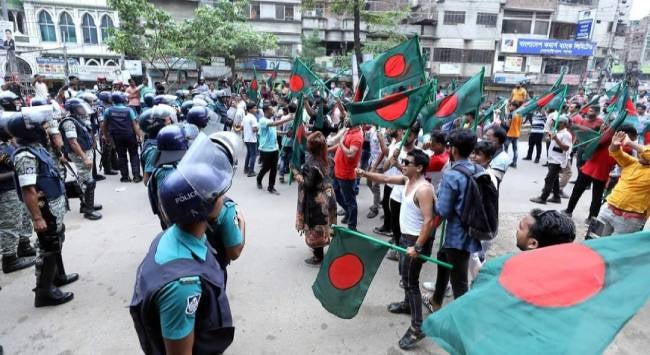Converging Challenges in Bangladesh:
Complexities in the Lead-up to Elections
Imran Ahmed
10 August 2023Summary
With positive strides in social development, Bangladesh aims to transition from a least developed country to a developing one by 2026. However, while aspiring for democratic revival, the country faces economic and political challenges. It is also grappling with natural disaster vulnerabilities and climate change risks, even ranking seventh globally for extreme weather impact. Amid this, it navigates new economic difficulties prompted by the COVID-19 pandemic and global events, seeking International Monetary Fund support. Concurrently, growing authoritarianism under Prime Minister Sheikh Hasina’s rule raises concerns about eroded political freedoms, although her strategic alliances ease international pressure. Despite economic progress, this authoritarian approach might jeopardise recent achievements and may have an impact on the forthcoming elections.
Bangladesh is gearing up for elections which are scheduled for January 2024. As the electoral date draws near, increasing attention is being directed towards the country’s economic and political obstacles, along with its democratic prospects. The country has received praise for its notable advancements in social development indicators, and it is expected to transition from the status of a least developed country to a developing country by 2026, offering both optimism and promise. Notably, Bangladesh’s per capita income surpasses that of both India and Pakistan, and it boasts the highest gross domestic product growth rate in South Asia. Additionally, the completion of the Padma Multipurpose Bridge last year, despite facing significant delays, engineering difficulties and financing issues, has been hailed as a significant infrastructure accomplishment.
Bangladesh’s economic successes have sparked discussions among scholars and commentators, who attribute these successes to a blend of factors, including well-executed economic planning, inclusive social policies, the empowerment of women, the crucial role of expatriate remittances and the impressive growth of its garments industry. However, amid these achievements, the nation grapples with ongoing challenges, particularly its vulnerability to natural disasters and its position among the world’s most at-risk countries when it comes to the detrimental effects of climate change. Bangladesh holds the seventh position among the countries that have been most impacted by extreme weather events from 2000 to 2019. Air and plastic pollution remain a persistent problem and declining groundwater, increasing pollution and saltwater encroachment into freshwater sources implies that mitigating a water scarcity crisis is a growing concern. Despite commendable progress, Bangladesh continues to face the need for comprehensive strategies to address these persistent environmental threats and safeguard its socio-economic gains.
Bangladesh has also found itself battling new economic challenges in a changing and uncertain world. The adverse effects of the coronavirus pandemic and Russia’s invasion of Ukraine reverberated through the global financial landscape. Bangladesh approached the International Monetary Fund (IMF) to strengthen its foreign exchange reserves, securing a US$4.7 billion (S$6.3 billion) loan in January 2023. The statement issued by Rahul Anand, IMF’s Mission Chief for Bangladesh, at the conclusion of his visit to the country in early May 2023, explained that “Against a challenging economic backdrop, Bangladesh remains one of the fastest growing economies in the Asia-Pacific region. However, persistent inflationary pressures, elevated volatility of global financial conditions, and slowdown in major advanced trading partners continue to weigh on growth, foreign currency reserves, and the Taka.”
Increasing authoritarianism in Bangladesh has been a mounting concern as political unrest grapples the country. Prime Minister Sheikh Hasina and her party, the Awami League, are seeking a fourth term in power but the most recent two elections have neither been free nor fair. Recent rallies have demanded a neutral caretaker government to guarantee impartial and inclusive elections. Hasina’s rule has seen the suppression of political freedom and civil liberties, and the repression of journalists, activists and political opposition. The use of law enforcement to subdue, silence and intimidate the government’s critics continues to draw allegations of gross violations of human rights. Specifically, the Rapid Action Battalion (RAB), a paramilitary unit comprising individuals from the police, army, navy, air force and border guards, has garnered international notoriety for its alleged role in extrajudicial killings, torture and enforced disappearances. As a response, United States (US) President Joe Biden’s administration imposed sanctions on six former top RAB officials, including former police chief, Benazir Ahmed in 2021. Most recently, US Secretary of State Anthony Blinken announced the imposition of visa restrictions on individuals and their immediate family members responsible for, or complicit in, undermining the democratic election process in Bangladesh.
However, Bangladesh’s significant strategic value to both the global and regional powers has enabled Hasina to leverage these relationships, reducing US pressure for democratic reforms. India, China, Iran and Russia favour the status quo. This has prompted journalist Ahmede Hussain to comment, “South Asia’s longest-serving tin-pot dictator may be tempted to crown herself the prime minister for the fourth time in a row through another rigged election.” Despite the socio-economic progress achieved during Hasina’s tenure, it has come at the expense of a contracting political sphere and civil society. An important question arises regarding whether this authoritarian approach might lead to increased cronyism, collusion, corruption and economic mismanagement in the long run, potentially undermining the country’s recent economic achievements.
. . . . .
Dr Imran Ahmed is a Research Fellow at the Institute of South Asian Studies (ISAS), an autonomous research institute in the National University of Singapore (NUS). He can be contacted at iahmed@nus.edu.sg. The author bears full responsibility for the facts cited and opinions expressed in this paper.
Pic Credit: BNP’s Twitter Account
-
 More From :
More From :
-
 Tags :
Tags :
-
 Download PDF
Download PDF



